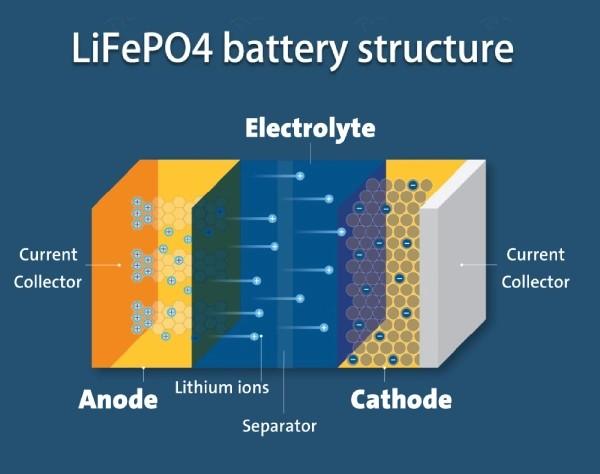
Lithium Iron Phosphate (LiFePO4) batteries have emerged as one of the most talked-about and broadly embraced energy storage technologies on the market. Valued for their safety, long service life, and adaptability, these batteries energize everything from electric cars to renewable energy setups. In this guide, we’ll explore exactly what LiFePO4 batteries are, their benefits and limitations, how they stack up against other types of lithium-ion batteries, and where they’re commonly used.
A LiFePO4 battery—short for Lithium Iron Phosphate battery—is a rechargeable lithium-ion battery that uses iron phosphate as its cathode material. This specific chemistry distinguishes it from other common lithium-ion types like lithium cobalt oxide (LiCoO₂) or lithium manganese oxide (LiMn₂O₄).
Key characteristics include:
- Stable chemistry, which lowers the risk of overheating.
- A nominal voltage of roughly 3.2–3.3 volts per cell.
- A rechargeable cycle life that is notably longer than many alternatives.
Thanks to these traits, LiFePO4 batteries are often chosen in situations where safety, durability, and efficiency take priority over achieving the highest energy density.
1. Wide Operating Temperature Range
LiFePO4 batteries perform reliably in temperatures ranging from -20°C to 60°C (-4°F to 140°F), making them well-suited for outdoor and automotive uses.
2. Long Cycle Life
Compared to lead-acid and standard lithium-ion batteries, LiFePO4 batteries last much longer. They typically endure 2,000 to 7,000 charge-discharge cycles, depending on usage, which can translate to 8–15 years of service in many settings.
3. Excellent Safety
Their chemistry is highly stable, greatly reducing the risk of thermal runaway or fire. Even under harsh conditions, LiFePO4 batteries maintain a strong safety record, especially when used with a capable Battery Management System (BMS).
4. Low Self-Discharge
When not in use, LiFePO4 batteries lose their charge very slowly. This makes them ideal for backup power systems and devices that need to stay ready over long periods.
5. Eco-Friendly
Made from non-toxic, earth-abundant materials, LiFePO4 batteries are more sustainable than cobalt- or nickel-based alternatives. They are also recyclable, adding to their green credentials.
6. Fast Charging Support
These batteries can safely accept high charge currents, allowing for quick recharge times without sacrificing long-term health.
1. Lower Nominal Voltage
With an operating voltage of 3.2–3.3V per cell (compared to 3.6–3.7V for other lithium-ion types), more cells are often needed to reach the same total voltage, which can complicate design.
2. Lower Specific Power
While very stable, LiFePO4 batteries may not supply the same peak power as some other lithium-ion chemistries. For applications that demand extremely high discharge rates, other options might be more suitable.
When comparing LiFePO4 to other lithium-ion types like Lithium Cobalt Oxide (LiCoO₂) or Lithium Manganese Oxide (LiMn₂O₄), several distinctions stand out:
| Parameter | LiFePO4 Battery | Other Lithium-Ion Batteries |
| Chemistry | Lithium Iron Phosphate | Various (LiCoO₂, LiMn₂O₄, NMC) |
| Energy Density | Moderate | High |
| Safety | Very High (Stable) | Moderate to High (More volatile) |
| Cycle Life | 2,000–7,000 cycles | Typically lower |
| Cost | Higher upfront | Varies by chemistry |
| Operating Temperature | -20°C to 60°C | More limited |
| Specific Power | Moderate | Higher |
| Charge/Discharge | Slower | Faster |
In summary, LiFePO4 offers superior safety and service life, while other chemistries may be preferable when smaller size and higher energy density are the main priorities.
Owing to their unique blend of safety, performance, and longevity, LiFePO4 batteries are used across a variety of fields.
1. Electric Vehicles (EVs)
LiFePO4 is widely used in EVs—especially buses, trucks, and entry-level cars—where long life and safety matter more than maximum range.
2. Renewable Energy Storage
In solar and wind power systems, these batteries provide residential and commercial energy storage thanks to their toughness and dependability.
3. Portable Electronics
Although not as compact as some alternatives, LiFePO4 batteries are used in power banks, laptops, and tablets where safety and extended lifespan are valued.
4. Marine and RV Power
Boats, yachts, and recreational vehicles benefit from their ability to withstand deep discharge cycles and perform under challenging environmental conditions.
5. Medical Devices
Used in critical medical equipment, LiFePO4 batteries are trusted where reliability and safety cannot be compromised.
6. Telecommunications
They serve in backup power systems for telecom infrastructure, delivering power during outages.
Q1: What’s the difference between a lithium battery and a LiFePO4 battery?
“Lithium battery” is a general term covering several chemistries. LiFePO4 is a specific type that uses lithium iron phosphate, offering better safety and cycle life than many other lithium-based batteries.
Q2: What is the main drawback of LiFePO4?
The lower energy density means they tend to be somewhat larger and heavier for the same capacity compared to other lithium-ion batteries.
Q3: Can I charge a LiFePO4 battery with a standard lithium-ion charger?
No. LiFePO4 batteries need chargers designed for their specific voltage profile to prevent damage and ensure correct charging.
Q4: How do you charge a LiFePO4 battery?
Charging usually involves two stages:
- Constant Current (CC): The battery is charged at a fixed current until it reaches a specified voltage.
- Constant Voltage (CV): The voltage is maintained while the current tapers off until charging is complete.
LiFePO4 batteries offer a safe, long-lasting, and environmentally conscious choice compared to traditional lithium-ion options. While they may not always provide the highest energy density, their outstanding stability, extended cycle life, and flexibility make them a preferred option for renewable energy storage, electric vehicles, and critical backup power applications.
If you're searching for a storage technology that delivers dependable performance with added peace of mind, LiFePO4 remains one of the most trustworthy solutions available today.
Previous:China's Lithium Battery Export Controls Reshape Global Energy Landscape